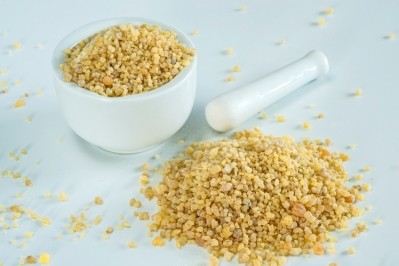Boswellia extract scores well in COX-2 comparison
inhibitor in a controlled clinical study to assess its effect on
relieving osteoarthritis pain, researchers report in the Journal of
Indian Pharmacology.
Boswellia serrata has a long history of use in Ayurvedic medicine, popular in India, and its gum resin is reputed to have anti-inflammatory, anti-arthritic, and analgesic activities. Although in a randomized, double-blind clinical controlled study Boswellia serrata extract was reported to be better than a placebo in relieving osteoarthtritis symptoms in the knee, researchers at the Government Medical College in Nagpur decided to conduct the new research since no comparative clinical trial using the extract has been reported. Their positive findings give further backing to the efficacy of the extract in addressing joint health - an area in which patients have been casting about for natural alternatives to COX-2 inhibitors following revelations about serious adverse events and subsequent withdrawals. The study - which was randomised, prospective and open label - involved 66 patients aged between 40 and 70 years, with primary osteoarthritis of the knee. They were assigned to one of two groups: one receiving 333mg of Boswellia serrata extract (BSE) three-times a day, and the other 10mg of valdecoxib once a day. The BSE used was Cap Wokvel, manufactured in India by Pharmanza India and containing a minimum 40 per cent boswellic acids. The valdecoxib was Tab Valdon, from Cadila Pharamceuticals. The patients were assessed using the WOMAC scale each month over the six-month intervention period, and once more at the end of the seventh month to assess residual effect. The WOMAC (Western Ontario and McMaster University Osteoarthritis Index) is a common assessment for osteoarthritis, using 24 questions. The researchers found that in the valdecoxib group a statistically significant improvement was seen after just one month, but the effects finished as soon as the intervention finished. For the Boswellia group, a statistically significant improvement was seen after two months, but the effect was still in evidence at the end of the study. "BSE showed a slower onset of action but the effect persisted even after stopping therapy, while the action of vadecoxib became evident faster but waned rapidly after stopping treatment," they wrote. On the safety front, one patient dropped in the BSE group dropped out due to diarrhoea, but it was not clear whether this was the result of the intervention. No serious adverse events were reported for valdecoxib group during the study. However the drug, which was the most recent on the scene at the time of the study (2003-4) and being widely prescribed, has since been banned in India due to serious cardiovascular and dermatological AERs. The conclusion published in the journal was: "In terms of safety, efficacy and duration of action, the present study shows that BSE was superior to valdecoxib, except for the slower onset of action compared to valdecoxib." Reference: Publication: Indian Journal of Pharmacology February 2007, vol 39, issue 1, 27-9 Title: Open, randomized, controlled clinical trial of Boswellia serrata extract as compared to valdecoxib in osteoarthritis of knee Authors: S Sontakke, V Thawani, S Pimpalkhute, P Kabra, S Babhulkar, L. Hingorani












